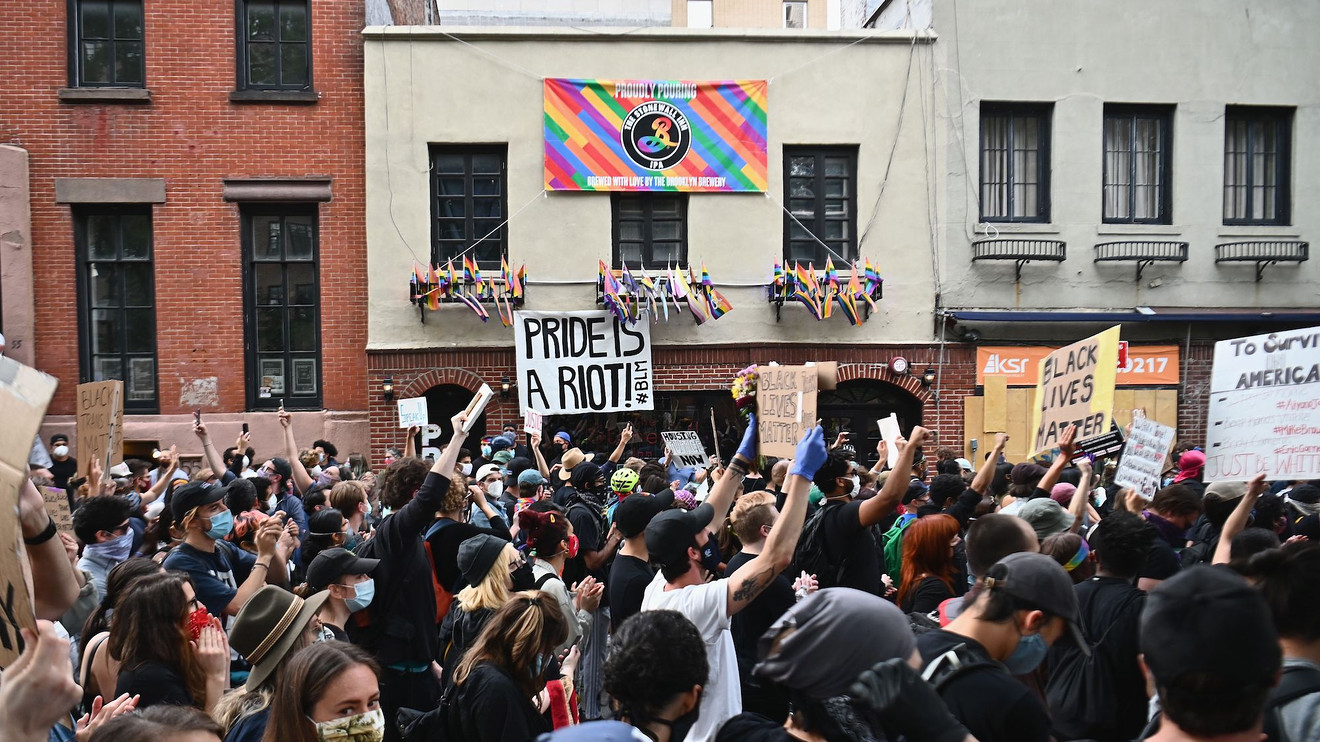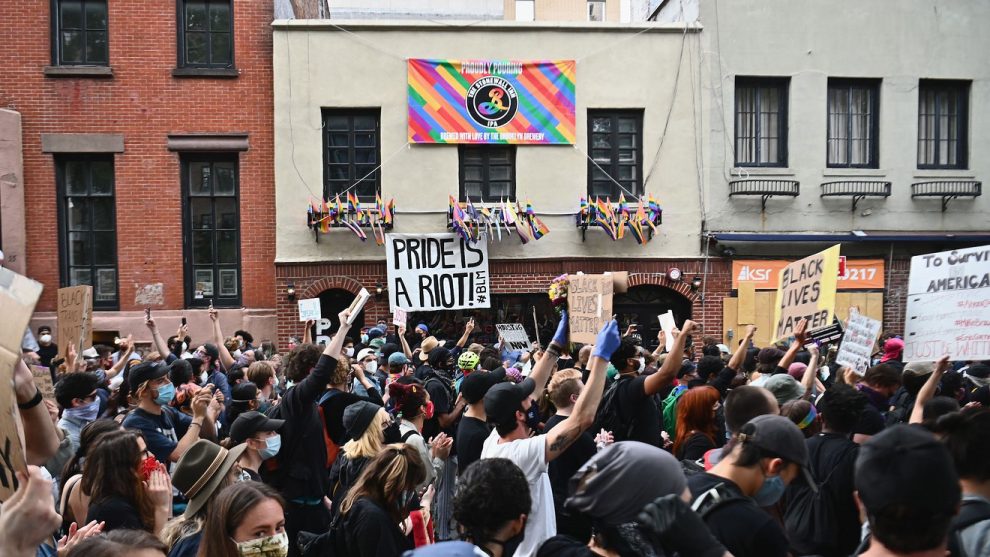
Since 1970, the New York City Pride parade has become a huge demonstration and celebration for the LGBTQ community. Its cancellation this year — a first in its long history — is especially difficult since 2020 marks the march’s 50th anniversary.
But the show of pride must go on. And it will go on, a number of New Yorkers said, with a heightened sense of unity with the Black Lives Matter movement whose urgent protests are echoes of pride’s roots in an uprising.
“It’s incredible to see the solidarity that’s happening right now gathering around the Black Lives Matter movement,” said Benj Pasek, an award-winning songwriter who will load up his own festivities when the parade steps off virtually on June 28 with a music playlist in which love is a recurring theme.
“Ultimately, Pride is based on a protest against police brutality, and it’s comforting to me to know that there are so many members of the LGBTQ+ community who are fighting for the rights of our friends and colleagues in the black community,” Pasek said. “That fight is alive and well, and we honor our history by being a part of fighting the injustices that are occurring today.”
In addition to songs of love, the power of protest will guide Pasek, who with composer Justin Paul, has won an Oscar for “La La Land,” a Tony for “Dear Evan Hansen,” and a Golden Globe for “The Greatest Showman.” Outcry looms large following the police killing of George Floyd in Minnesota.
“This year,” Pasek added, “I’m going to try and be as active as possible in looking for ways to use Pride’s roots as a means of connecting to what’s happening today. I want to use my voice to link these protests that are both fighting for justice.”
Pasek, 35, who lives on the Upper West Side of Manhattan, isn’t alone. Other members of the LGBTQ+ community are doing likewise. They’re looking back to Stonewall demonstrations of 1969 and connecting the dots to the Black Lives Matter movement.
“Throughout our nation’s history, we have been made better by the voices and protest of Black leaders and #Pride is no different,” New York City Council Speaker Corey Johnson tweeted on June 1.
“The first Pride was a protest against police brutality towards LGBTQ people, spearheaded by Marsha P. Johnson, a black trans woman, and Sylvia Rivera,” Johnson added.
Rivera was a Latin American gay liberation and transgender rights activist.
“As we enter #PRIDE2020 let’s remember that in fighting for LGBTQ people, the fight must be just as much for Black lives,” Johnson noted. “We might not be able to march the way we normally would, but we can continue to ‘march’ in spirit and action in the name of equality for all.”
Also see: In vulnerable communities, Lorena Borjas was who you turned to for help
Last year, which marked World Pride Day and the 50th anniversary of Stonewall, the event drew an estimated 150,000 marchers in Manhattan — twice as many as for a typical year — and some 2.5 million spectators cheering from the sidelines.
This year’s march leaves the streets of the city behind for a virtual special broadcast event — a 50th anniversary of the first Pride March held in 1970. It airs on ABC on June 28 from 12 p.m. to 2 p.m.
See: New York City’s daily infection rate dwindles to 1%
“Though it will be a very different type of celebration, the tradition of commemorating the LGBTQIA+ will continue,” notes the organizer NYC Pride in a statement. “In this unique year, NYC Pride is committed to saluting front-line workers alongside several leaders in the community.” The event will feature performances by Janelle Monai, Deborah Cox, Billy Porter and others.
“Orange Is the New Black” actress, pioneering comic and activist Lea DeLaria, 62, has been a frequent participant in NYC Pride March. “I have a very deep connection. My first New York Pride was 1986,” she said, adding that she’s “marched, been a rally host and served as Grand Marshal.” She draws a direct line between Pride and Black Lives Matter.
“Stonewall was a riot. The first gay pride was a riot,” she said. “Bricks were thrown through windows. There would be no gay pride if it wasn’t for a riot.”
DeLaria, welcomes anger, urgency, and politics to the annual parade. The same ingredients reverberate in “F— Love,” her 2019 show being live streamed on June 18 by Joe’s Pub at the Public Theater as part of its monthlong Pride celebrations.
“I went to the parades early on because they were protest marches and demands for our rights,” DeLaria said. “A few years ago, especially around marriage equality and what happened in Orlando [mass shooting at a gay nightclub], I feel we’ve gone back to a sort of rageful protest. So I’ve come back to pride. Don’t get me wrong, I love the party. But protest is the most important thing.”
Actress, author and transgender activist Shakina Nayfack, 39, agrees. “Pride is about queer resilience, it’s a celebration of difference and inclusion,” Nayfack said. “It’s also about community, and with most of us stuck at home this June, we need that experience of joyous connection now more than ever.”
Corporate America will also be part of virtual events, considering the economics of Pride and what’s been called “the pink dollar.” LGBT consumers spend $917 billion every year on goods and services.
“There’s talk every year about whether Pride is too corporate,” said Jonathan D. Lovitz, senior vice president of the National LGBT Chamber of Commerce. “Well, that being on full display, advertising themselves as a place where anyone can work, where anyone will be welcomed, where their support for our community is more than just dollars, it’s about opportunities.”
“Not only do LGBT people spend over $917 billion on goods and services every year, but over 70% of those purchases are determined by what we think about corporations’ commitment to our community,” Lovitz said. “If we know you stand with us, we’re willing to reward that with consumer loyalty.”
Broadway actress Lauren Patten, 27, who co-stars in the Alanis Morissette musical “Jagged Little Pill,” now on a pandemic pause, said she’d miss in-person Pride events. “It is really meaningful to me to walk the same streets around Stonewall during Pride,” said Patten, who lives in lower Manhattan. “It is a tangible connection to our history.”
“Jagged Little Pill” producer Eva Price, 41, whose credits include Tony-winning revivals of “Oklahoma!” and “Angels in America” as well as the original musical “Dear Evan Hansen,” feels the sense of the past.
“It’s important to remember and celebrate all the forebears who fought for gay rights, and human rights, throughout history before us,” said Price, who lives in the East Village.
“Pride is not just a celebration and a fun day to hang out with your queer friends,” Patten added. “It is a thank you to our marginalized ancestors who rose up against systemic discrimination and demanded a safe place in this world. We must honor them. Pride is also still a fight.”
Don’t miss: As Biden widens polling lead over Trump, here’s who could be his vice-presidential pick
Amid the fighting there is room for optimism, judging by a song on the Pasek parade-day playlist. It’s “O-o-h Child,” a 50-year-old hit by the Five Stairsteps.
“Someday we’ll walk in the ray of a beautiful sun,” the lyrics promise. “Someday when the world is much lighter.”
In the meantime, pride, protest, and solidarity all march on.











Add Comment